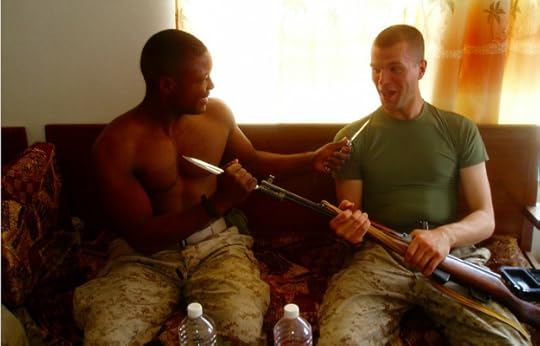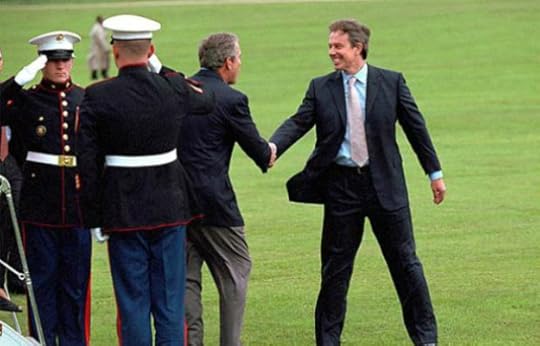Thomas E. Ricks's Blog, page 92
September 6, 2013
How to know if President Obama has ordered covert actions against Assad

Like I said the other day, I expect that even if Congress declines to
authorize the use of military force in Syria, President Obama will order a
variety of covert actions in support of the rebels.
How can we know if these are occurring?
Basically, I think we should look for things happening that the rebels would have
liked to do a long time ago but were unable to carry out. For example,
assassinations of senior Syrian officials. I could see, for example, stealthy
drone attacks on the convoys of the officials who oversaw the use of chemical
weapons -- but credit being given to Syrian rebels. I also think we could see
things like signals intercepts being passed to the rebels, as well as other
helpful intelligence, like real-time satellite imagery. Basically, any
anomalous action bears a second look.
Fast transmission of targeting info
could significantly boost the effectiveness of the opposition, I think. I've
been told that, during the Iran-Iraq War, the U.S. provided Saddam Hussein's
air force with good photo imagery of Iranian military targets, such as major
supply depots and corps-level headquarters, and that the subsequent Iraqi airstrikes
broke an Iranian offensive and so changed the balance of the war.
Yet even as I discuss this, I wonder:
If the rebels win, how will they treat Armenians, Jews, Christians, and other
minorities?
What I don't understand about the Manning case -- and what that may say about accountability in today's Army

Speaking of nutjobs, what I don't
understand about the Manning case is where the hell his chain of command was.
The guy was clearly unstable, it would seem from the testimony. So why was he
let within 100 feet of classified information?
I did a Google search but couldn't find any indication that
his senior NCO, or his company commander, have been held accountable. I did see
a reference saying that his company commander was unaware of Manning's
behavioral issues. I don't think that ignorance is a good alibi here. At the
very least here, there is probably a good case study of commanders being asleep
at the wheel.
RF's War Dog of the Week: Guest lions
September 5, 2013
Expert: The Arctic isn't going to be an economical shipping route anytime soon

The July issue of Proceedings had a good article knocking down the notion that
the melting of the polar ice cap means that merchant ships soon will be
short-cutting through there.
The major reason offered by Stephen
Carmel of Maersk Line is that the Arctic routes can only take ships with drafts
of less than 40 feet, which excludes a lot of big carriers. Also, the Northern
Sea route, across the top of Russia, has a beam restriction of 30 meters, as
ships cannot be wider than the icebreakers supporting them.
His bottom line is that contrary to
some assertions, "Arctic routes do not now offer an
attractive alternative to the more traditional maritime avenues, and are highly
unlikely to do so in the future."
My one quibble: If there were a major
and long war at a significant chokepoint, such as the Suez Canal or Indonesia,
that might encourage shipbuilders and shipping companies to adjust to the
constraints of the Arctic.
A col.'s view of commander's authority

By Col. Ellen Haring, U.S. Army
Best Defense guest columnist
When I was a lieutenant stationed in
Germany, one of my soldiers was murdered. Not for a second did my commander
consider investigating the crime himself. Instead, he immediately turned the
case over to the Army's Criminal Investigation Division (CID) and the German
police. By contrast, later when I was a major stationed in Hawaii, I was
assigned to be the investigating officer in a rape case.
At the time, it didn't occur to me to
question why the rape investigation came my way and the homicide investigation
did not. Presumably, my name was the next one up on the duty roster. Whatever
the case, I now know that I horribly failed the young women who reported the
crime. How could it be otherwise? I had limited resources to investigate their
allegations and so little training that I didn't even know what resources I
lacked.
Three junior enlisted women claimed to
have been raped at different times by the same non-commissioned officer (NCO). None
of them came forward when the crimes occurred. They were all new to the unit,
they were afraid, they were ashamed, and they were traumatized. Over time, they
connected and confided in each other, and one decided to report the NCO.
The commander responded by elevating
the case to the next higher level command where I was appointed as the
"investigating officer" on the case. For support, I was given the advice of a
staff lawyer and a copy of Army Regulation 15-6, which directed me to ascertain
and report on the facts using "informal means." Although I was committed to
doing an investigation that was thorough and fair, I realize now that I had no
clue how to accomplish either objective.
Over the years, this case has bothered
me. Recently, I asked my sister, a police officer, what the police would have
done to investigate. Off the top of her head, she came up with some steps that
I did not take, did not know to take, and had no authority to take. First,
police might have applied for a warrant to search the NCO's home for evidence
that he was a serial sexual predator. Unlike real police investigators, I did
not know that serial predators often hold onto physical evidence of their
misdeeds, which in this case could have included the drug that the women
believed the NCO had used to incapacitate them. Second, the police might have
asked the victims to record conversations with the NCO in an effort to obtain
admissions that would help to determine who was telling the truth and who was
lying. Finally and most basically, unlike me, the investigators who interviewed
the NCO and the victims would have known how to carry out such an interview.
At the end of the day, I was left to
resolve the basic "she said, he said" conundrum with nothing more to go by than
the parties' sworn statements. I believed the women's statements, and my report
included a finding that the NCO had committed rape. Although I was never given
any details, I believe that the commander's final decision was to reassign the
NCO to another unit. If so -- and if indeed the NCO was a rapist -- I fear that
this remedy simply gave him the opportunity to prey on other women.
Recently, I also asked a JAG friend why
I -- and not the CID -- had investigated this case. I was surprised to learn
that rape investigations do fall under the investigative authority of the CID
and not the commander. However, there is a catch in rape cases, which turns out
to be a big one. Commanders have the authority to investigate "indecent acts
when consensual." Although the three women reported that the NCO had raped
them, the commander apparently decided on his own that the case may have
involved consensual acts, making it unnecessary to proceed with a formal CID
investigation.
I do not believe that the commander's
actions were malicious. Nor do I think that he intended to cover up a crime. Still,
his response speaks volumes to the way in which our culture continues to
devalue the experiences of women who have been sexually assaulted. Until sexual
assault, in any form, is viewed as a major crime, we will continue to treat it
as if it warrants only an informal investigation that may be resolved by
removing the perpetrator from the vicinity of the victims.
Military commanders are not jacks of
all trades. Rape and sexual assaults are major crimes that require specialized
investigative training. Commanders don't conduct their own murder
investigations and they shouldn't be allowed to conduct their own sexual
assault investigations. Senator Gillibrand's move to take criminal
investigative discretionary authority out of the hands of commanders is on
target and should be supported by both the military and elected
representatives.
Ellen
Haring is a U.S. Army reserve colonel and a non-residential fellow at both the
Stockholm International Peace Research Institute (SIPRI) and Women in
International Security (WIIS). She is the project director of the Combat
Integration Initiative. Ellen is one of two plaintiffs in the first U.S.
lawsuit that challenged the constitutionality of the U.S. military's direct
ground combat exclusion policy that limited the roles and responsibilities of
female servicemembers. Ellen is a West Point graduate and she is currently
completing a Ph.D. in conflict analysis and resolution at George Mason
University's School for Conflict Analysis and Resolution. This represents her
own views and are not necessarily those of the U.S. Army or the Department of
Defense.
September 4, 2013
Censorship in China: A hot new Harvard study finds it huge -- and quite revealing

I hear from a friend who is a political
scientist that the hottest study in his world is a paper by Harvard's Gary
King on
social media censorship in China. Or, as King puts it, "the largest selective
suppression of human communication in the history of the world."
The bottom line seems to be that, going
by what they censor, Chinese authorities most fear collective action -- that
is, not individual protests or outcries, but the threat of people getting
together.
Here is a link to the paper. Here is the summary
of it from Professor King's website:
Chinese government censorship
of social media constitutes the largest selective suppression of human
communication in the history of the world. Although existing systematic
research on the subject has revealed a great deal, it is based on passive,
observational methods, with well known inferential limitations. We attempt to
generate more robust causal and descriptive inferences through participation
and experimentation. For causal inferences, we conduct a large scale randomized
experimental study by creating accounts on numerous social media sites spread
throughout the country, submitting different randomly assigned types of social
media texts, and detecting from a network of computers all over the world which
types are censored. Then, for descriptive inferences, we supplement the current
approach of confidential interviews by setting up our own social media site in
China, contracting with Chinese firms to install the same censoring
technologies as existing sites, and reverse engineering how it all works. Our
results offer unambiguous support for, and clarification of, the emerging view
that criticism of the state, its leaders, and their policies are routinely
published whereas posts with collective action potential are much more likely
to be censored. We are also able to clarify the internal mechanisms of the
Chinese censorship apparatus and show that local social media sites have far
more flexibility than was previously understood in how (but not what) they
censor.
Two e-mails from Marines: Who is right?

Last month (mid-August) the Marine
Corps announced that it would start firing captains and majors who have
repeatedly been passed over for promotion. Or, as the announcement of the
policy change put it, "EFFECTIVE
IMMEDIATELY, MARINE CORPS POLICY IS TO SELECT FOR CONTINUATION ONLY THOSE TWICE
PASSED MAJORS AND TWICE PASSED CAPTAINS WHOSE CONTINUED SERVICE IS IN THE BEST
INTERESTS OF THE MARINE CORPS BASED ON THE NEEDS OF THE MARINE CORPS IN
ACCORDANCE WITH CRITERIA ESTABLISHED BY THE SECRETARY Of THE NAVY."
Two e-mails about this appeared in my
inbox.
The first was from a more senior Marine officer: "We are institutionally breaking faith all over the
place. Amos is killing the soul of the Corps. His legacy is going to be one of
division and resentment."
The other, immediately above it, was
from a field-grade officer: "About time."
Which one is right?
Best correction of the summer, Hoss

From the friendly folks at the Duffel Blog:
CORRECTION: Our non-existent fact checking
staff has confirmed that ‘Hoss' Cartwright was a character on Bonanza, not the Dukes of
Hazzard.
The writer, who is senile, has been fired and banished to the worst place on
earth: Camp Buehring, Kuwait. In his defense, he was trying to make a
connection between Gen. Cartwright and ‘Boss' Hogg. However, we deeply
apologize for the error and are glad the entire internet is out in force to set
the record straight. And also, thank you for your service.
September 3, 2013
While we were out (II): Did Pres. Obama just back out of backing into Syria?

I hope so. By going to Congress for
approval before intervening, he seems to be asking for someone to get him out
of this mess.
Until the end of last week it looked to
me like he had painted himself into a corner on Syria. He didn't want to
intervene, but he threw around some red line language about the consequences of
the Syrian government using chemical weapons and in
August the bill on that had come due.
I take no joy in saying that the
president looks really bad in his handling on this. Bumbling, stumbling, fumbling.
I've heard his handling of Syria referred to as "Operation Rolling Blunder."
Getting involved there militarily is something almost no one in the United
States wants, aside from a few old-school hawks in Washington. In fact, it is
possible that I know the majority of people in the United States who favor
intervention. They could fit into a Starbucks even after some full-fat lattes.
If their desired attack ever happens,
my guess is that it will last about a week. It would begin with missile strikes
against air defense systems (radars and communications nodes), then move to hits
on airfields by long-range stand-off missile-like "bombs" launched offshore by
B-2s (because cruise missiles really can't crater airfields) and also hits
against other command and control systems. Finally, it would assault "regime
targets" -- command bunkers, intelligence headquarters, ruling class
hideouts.
And then what? Will this limited action
remain limited? Will it help the Syrian rebels? Should we be helping them?
It is not clear to me how American
intervention would improve the situation. Also, I am struck that I don't know a
single person in the U.S. military who thinks that attacking Syria is a good
idea. Even with Iraq in 2003, there was a minority of officers who supported that
invasion. Here's James Fallows's astute summary of the state of the argument, and his
assessment of the latest move.
My guess: While Congress talks, Obama
will quietly step up all kinds of covert aid to the rebels, but not publicly
intervene.
Finally! The British say 'no' to supporting U.S. military action in the Middle East

Not gonna be roped in, the British Parliament says. Not gonna happen! Ten years too late.
"You're a disgrace," shouts a cabinet member. Like I
said, Hon. Dude: Where were you in 2003?
Thomas E. Ricks's Blog
- Thomas E. Ricks's profile
- 437 followers


 Rebecca F. is busy this week, but sends along this
Rebecca F. is busy this week, but sends along this
